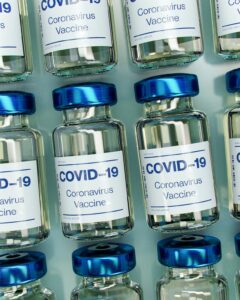
The coronavirus pandemic has reshaped the labor force in the United States and across the world, causing millions to be unemployed and millions of others to work from home. The changes are likely to remain in place for quite some time. As those who are unemployed look to getting hired and remote employees prepare for an eventual return to brick-and-mortar offices, many are asking the same question: Can companies require a COVID-19 vaccination for their workers?
An Urgent Question
Not surprisingly, this question has come front-and-center since the U.S. Food and Drug Administration (FDA) granted emergency use authorization to Pfizer and BioNTech’s COVID-19 vaccine in early December.
The short answer to the question of whether or not an employer can make COVID-19 vaccination a requirement for continued work or new hire is “yes.” There are, however, exceptions for potential concerns relating to an individual’s religious beliefs or any disability that may prohibit vaccination. Moreover, experts believe that employers will likely encourage workers to get immunized instead of imposing a company-wide requirement.
According to the Equal Employment Opportunity Commission (EEOC), a COVID-19 vaccination requirement would not in and of itself violate the Americans with Disabilities Act (ADA), which prohibits employers from requiring workers to undergo some types of medical exams. A vaccine administration that does not seek information about the worker’s current health status or impairments is not considered a “medical examination.”
What to Do
Generally, employment in the United States is “at will.” This means that an employer may set working conditions, including those addressing health and safety, with few limitations. The limits on these working conditions are tied to federal laws such as the ADA and Title VII of the Civil Rights Act of 1964 (Title VII). That being said, there are some steps you may be able to take to avoid getting immunized if you do not want to:
- Seek a vaccination exemption on medical grounds;
- Seek a vaccination exemption due to religious beliefs; or
- Seek alternative accommodations (such as working from home, working separately from others, or using personal protective equipment).
According to the EEOC, even if an employee who cannot be vaccinated due to disability poses a risk to the workplace and employer cannot take an adverse action unless there is no way to provide a reasonable accommodation that would reduce others’ risk.
Other Concerns
Medical or religious beliefs accommodations are just two factors companies need to consider when determining whether or not to institute a vaccination requirement. Just like employers facing lawsuits claiming a worker contracted COVID-19 at the workplace, if a vaccine causes harmful results an employer could be dragged into a lawsuit along with the manufacturer.
In reality, the industry that is most likely to require workers to take COVID-19 vaccinations is in healthcare and other high-risk jobs. Most employers in this industry already require workers to have an annual flu shot. Moreover, the CDC’s interim guidance on who should be the first in line to get COVID-19 vaccinations includes healthcare personnel that are likely to treat those with COVID or be exposed to the disease.
Contact a Personal Injury Lawyer
If you have been hurt in Nevada, contact H&P Law. Our skilled lawyers are courtroom proven and will give you the best advice available for your situation. Contact our Las Vegas or Henderson office today.




